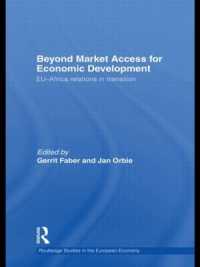- ホーム
- > 洋書
- > 英文書
- > Philosophy
Full Description
Is moral philosophy more foundational than political theory? It is often assumed to be. David Schmidtz argues that the reverse is true: the question of how to live in a community is more fundamental than questions about how to live. This book questions whether we are getting to the foundations of human morality when we ignore contingent features of communities in which political animals live.
Schmidtz disputes the idea that reflection on how to live needs to begin with timeless axioms. Rather, theorizing about how to live together should take its cue from contemporary moral philosophy's attempts to go beyond formal theory, and ask which principles have a history of demonstrably being organizing principles of actual thriving communities at their best. Ideals emerging from such research should be a distillation of social scientific insight from observable histories of successful community building. What emerges from ongoing testing in the crucible of life experience will be path-dependent in detail even if not in general outline, partly because any way of life is a response to challenges that are themselves contingent, path dependent, and in flux.
Building on this view, Schmidtz argues that justice evolved as a device for grounding peace in the mutual recognition that everyone has their own life to live, and everyone has the right and the responsibility to decide for themselves what to want. Justice, he says, evolved as a device for conveying our mutual intention not to be in each other's way, and beyond that, our mutual intention to build places for ourselves as contributors to a community. Any understanding of justice should thus rely not on untestable intuitions but should instead be grounded in observable fact.
Contents
Acknowledgements
Preface
Introduction
1. The Rise and Fall of Moral Science
1.1. Philosophy Lost
1.2. The Is-Ought Problem
1.3. Justice As Traffic Management
1.4. What Is a Theory?
2. After Solipsism
2.1. Strategic Consequentialism
2.2. After Shallow Pond
2.3. What Works
2.4. Strategic Deontology
3. Toward a Realistic Idealism
3.1. Ideal Theory: What It Was
3.2. Justice Is Not a Peak
3.3. Compliance Is Not a Detail
3.4. High Standards
4. Political Economy & Moral Science
4.1. The Moral Science of Adam Smith
4.2. The Political Economy of Corruption
5. Political Economy & Moral Science II
5.1. Political Economy & the Rule of Law
5.2. Cost-Benefit Analysis as Moral Science
6. Inventing the Self
6.1. The Reconciliation Project
6.2. Rational Choice Theory's Silence About Ends
6.3. Reasons for Reasons
6.4. Navigating the Terrain of Reasons
7. The Possibility of Civilization
7.1. Ecological Justice
7.2. A Brief History of the Human Condition
7.3. Ideals as Specializations
References
Index








